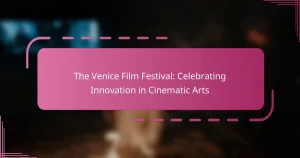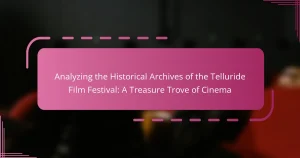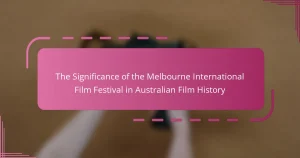The Rotterdam International Film Festival (IFFR) is an annual event in the Netherlands that focuses on independent and avant-garde cinema. Established in 1972, IFFR serves as a significant platform for filmmakers, showcasing a diverse array of films from around the globe while emphasizing innovative storytelling techniques. The festival includes various sections, such as competitions and retrospectives, and supports emerging talents through the Hubert Bals Fund, which provides financial aid for film projects from developing countries. By promoting avant-garde films and facilitating networking opportunities, IFFR plays a crucial role in enhancing visibility and fostering creativity within the film community.
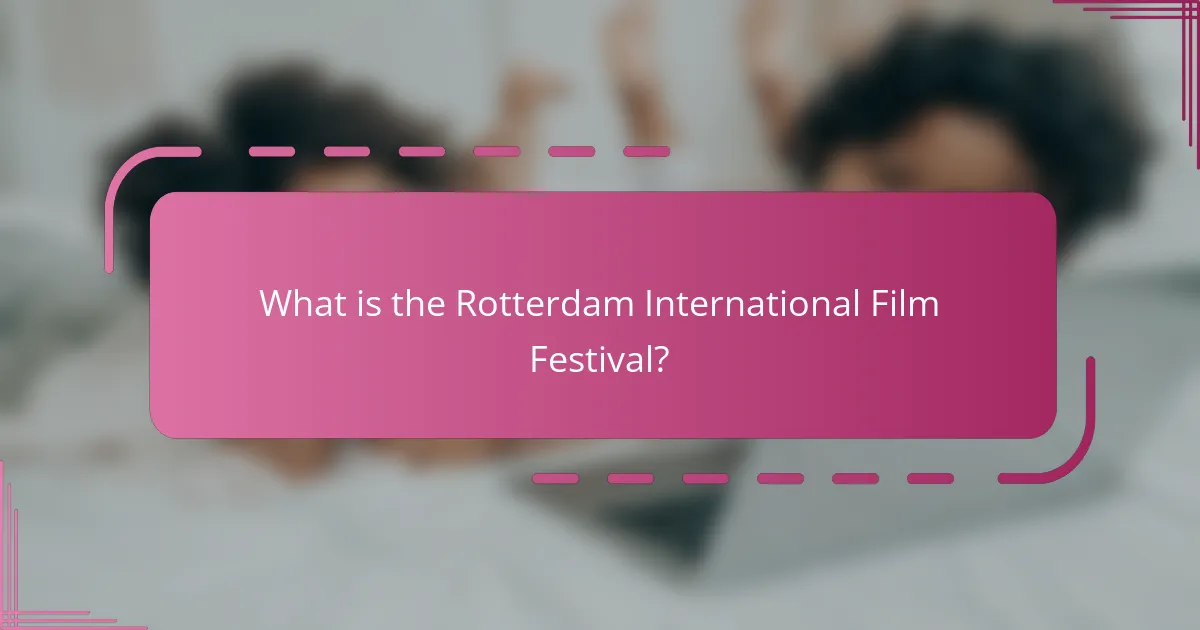
What is the Rotterdam International Film Festival?
The Rotterdam International Film Festival (IFFR) is an annual film festival held in Rotterdam, Netherlands. It focuses on independent and avant-garde cinema. Established in 1972, the festival has become a key platform for filmmakers. IFFR showcases a diverse range of films from around the world. It emphasizes new and innovative storytelling techniques. The festival features various sections, including competitions and retrospectives. IFFR also supports emerging talents through its Hubert Bals Fund. This fund provides financial aid for film projects from developing countries.
How did the Rotterdam International Film Festival begin?
The Rotterdam International Film Festival began in 1972. It was initiated by the Rotterdam Film Festival Foundation. The festival aimed to showcase independent and avant-garde films. Its first edition featured a selection of films that challenged conventional cinema. Over the years, the festival has grown significantly. It became a platform for emerging filmmakers. The festival focuses on innovative storytelling and experimental techniques. Today, it is recognized as one of the leading film festivals in the world.
What were the founding principles of the festival?
The founding principles of the Rotterdam International Film Festival include promoting innovative cinema and supporting filmmakers. The festival was established to showcase avant-garde films that challenge traditional narrative structures. It aims to provide a platform for emerging talents in the film industry. The festival emphasizes cultural diversity and artistic expression. It also seeks to engage audiences with unique cinematic experiences. These principles guide the festival’s programming and initiatives. The commitment to fostering new voices in cinema remains a core tenet.
Who are the key figures behind the festival’s inception?
The key figures behind the inception of the Rotterdam International Film Festival include Huub Bals and Jan de Bont. Huub Bals was a significant cultural figure in the Netherlands. He aimed to create a platform for innovative cinema. Jan de Bont, a filmmaker, contributed to the festival’s vision. Together, they established the festival in 1972. Their goal was to promote avant-garde films. The festival has since become a major event in the international film calendar. It showcases diverse and experimental works from around the world.
What is the significance of avant-garde films in cinema?
Avant-garde films are significant in cinema for their innovative approaches and challenge to traditional storytelling. They often explore unconventional narratives and experimental techniques. This genre pushes the boundaries of artistic expression and engages audiences in new ways. Avant-garde films encourage critical thinking and provoke discussion about societal norms. Historically, they have influenced mainstream cinema, inspiring filmmakers to take creative risks. Notable examples include works by directors like Maya Deren and Stan Brakhage. Their contributions have shaped the evolution of film as an art form. Avant-garde cinema remains essential for fostering creativity and diversity in the film industry.
How do avant-garde films differ from mainstream cinema?
Avant-garde films differ from mainstream cinema primarily in their experimental nature. Avant-garde films often prioritize artistic expression over commercial appeal. They challenge traditional narrative structures and cinematic conventions. Mainstream cinema typically follows established formulas for storytelling and audience engagement. Avant-garde films frequently explore unconventional themes and abstract concepts. They may employ non-linear storytelling and innovative visual techniques. Mainstream cinema usually aims for mass audience appeal and profitability. The Rotterdam International Film Festival showcases avant-garde films, emphasizing their unique artistic contributions.
What themes and techniques are commonly found in avant-garde films?
Avant-garde films commonly explore themes of experimentation, abstraction, and social critique. These films often challenge traditional narrative structures and employ non-linear storytelling. Techniques frequently used include unconventional editing, surreal imagery, and innovative sound design. For instance, filmmakers like Maya Deren and Stan Brakhage utilized visual symbolism and dreamlike sequences to convey complex ideas. Additionally, avant-garde films often incorporate mixed media and visual art elements, blurring the lines between film and other art forms. Historical context shows that these techniques emerged prominently in the early 20th century, influenced by movements like Surrealism and Dadaism.
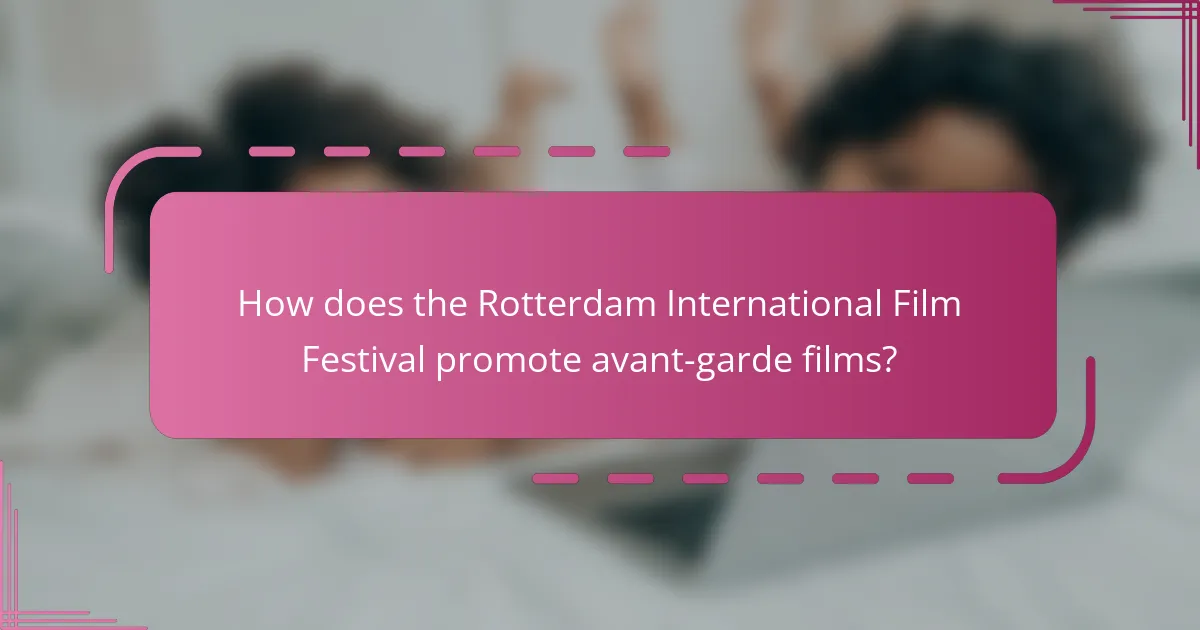
How does the Rotterdam International Film Festival promote avant-garde films?
The Rotterdam International Film Festival promotes avant-garde films through its dedicated programming and support for filmmakers. It features a specific section called “Bright Future” that highlights innovative and experimental works. The festival also offers networking opportunities for emerging directors and industry professionals. Additionally, it provides financial support through grants and awards for avant-garde projects. The festival’s focus on international cinema encourages diverse artistic expressions. It attracts a global audience, increasing visibility for avant-garde films. The Rotterdam International Film Festival has established itself as a key platform for avant-garde cinema since its inception in 1972.
What platforms does the festival provide for avant-garde filmmakers?
The Rotterdam International Film Festival provides several platforms for avant-garde filmmakers. These platforms include the Tiger Competition, where innovative films are showcased. The festival also features the “Bright Future” section, emphasizing new talent and experimental works. Additionally, filmmakers can participate in workshops and networking events. These opportunities facilitate collaboration and exposure within the industry. The festival’s focus on diverse storytelling further supports avant-garde cinema. Overall, these platforms are designed to promote and celebrate unique artistic expressions.
How does the festival facilitate networking among filmmakers?
The festival facilitates networking among filmmakers through organized events and structured opportunities for interaction. It hosts panel discussions where filmmakers can share insights and experiences. Networking sessions allow filmmakers to meet industry professionals and peers. The festival also provides workshops that encourage collaboration on projects. Additionally, social events create informal settings for filmmakers to connect. These activities foster relationships that can lead to future collaborations. The presence of industry representatives enhances networking potential significantly. Overall, the festival serves as a hub for filmmakers to build valuable connections.
What are the opportunities for audience engagement at the festival?
The festival offers various opportunities for audience engagement. Attendees can participate in Q&A sessions with filmmakers after screenings. Workshops and panel discussions allow for deeper exploration of avant-garde cinema. Networking events facilitate connections between filmmakers and audiences. Interactive installations enhance the overall experience. Social media campaigns encourage audience participation before and during the festival. Feedback forms provide a platform for attendees to share their thoughts. These initiatives foster a vibrant community around avant-garde films. Engaging with the audience enhances the festival’s impact and reach.
How does the festival curate its selection of avant-garde films?
The festival curates its selection of avant-garde films through a rigorous evaluation process. This process involves expert curators who assess submissions based on artistic innovation and thematic relevance. The festival prioritizes films that challenge conventional storytelling and visual aesthetics. Additionally, it considers the cultural context and potential impact of each film. The selection committee includes industry professionals with extensive experience in avant-garde cinema. Their expertise ensures a diverse and high-quality lineup. The festival also emphasizes emerging filmmakers alongside established artists. This approach fosters a dynamic environment for avant-garde film appreciation and exploration.
What criteria are used to select films for screening?
Films for screening at the Rotterdam International Film Festival are selected based on artistic merit, originality, and relevance to contemporary issues. The festival prioritizes innovative storytelling and unique cinematic techniques. Additionally, films that challenge conventional narratives or explore avant-garde themes are favored. The selection process also considers the cultural significance of the films. A diverse range of genres and styles are included to provide a comprehensive cinematic experience. The festival aims to showcase both established and emerging filmmakers. This approach enhances the visibility of avant-garde cinema on an international platform.
How does the festival support emerging avant-garde filmmakers?
The festival supports emerging avant-garde filmmakers through various initiatives. It offers platforms for showcasing their work. These platforms include competitive sections specifically for new filmmakers. The festival provides financial support through grants and awards. It also facilitates networking opportunities with industry professionals. Workshops and masterclasses are organized to enhance filmmakers’ skills. The festival promotes their films to a wider audience. This exposure can lead to future funding and collaboration opportunities.
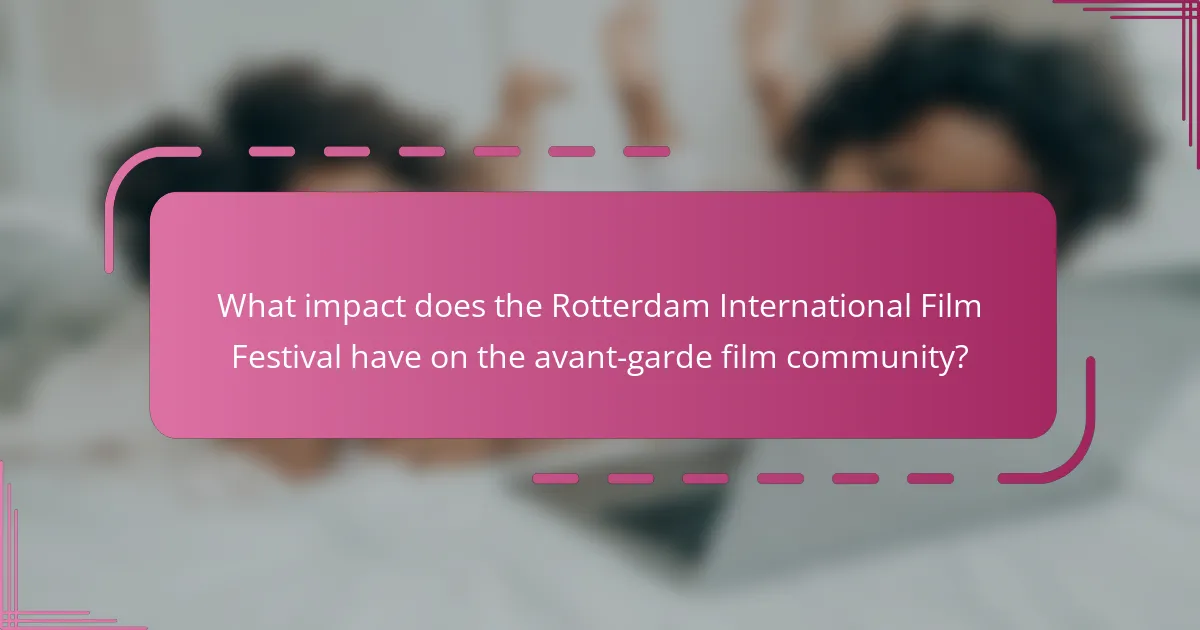
What impact does the Rotterdam International Film Festival have on the avant-garde film community?
The Rotterdam International Film Festival significantly influences the avant-garde film community. It serves as a crucial platform for showcasing innovative and experimental films. The festival highlights works that may not receive mainstream distribution. This exposure helps avant-garde filmmakers gain recognition and connect with audiences. Additionally, the festival facilitates networking opportunities among creators, distributors, and critics. It also offers funding and support initiatives for emerging talents. The festival’s focus on diverse storytelling promotes artistic exploration within the avant-garde genre. Overall, it strengthens the community by fostering creativity and collaboration.
How does the festival influence trends in avant-garde filmmaking?
The Rotterdam International Film Festival influences trends in avant-garde filmmaking by showcasing innovative and experimental works. This festival provides a platform for emerging filmmakers to present their unique visions. By prioritizing unconventional narratives and styles, it encourages creativity and exploration within the genre. The festival also fosters networking opportunities among artists, critics, and industry professionals. This interaction can lead to collaborations that push the boundaries of traditional filmmaking. Furthermore, the festival’s awards and recognition can elevate the profiles of avant-garde films, attracting wider audiences. Historical data shows that many films premiered at the festival have gone on to gain critical acclaim and influence future projects in the avant-garde space. Thus, the festival plays a crucial role in shaping the evolution of avant-garde cinema.
What role does the festival play in the global distribution of avant-garde films?
The festival plays a crucial role in the global distribution of avant-garde films by providing a platform for exposure. It showcases innovative works that might not find traditional distribution channels. The Rotterdam International Film Festival, for example, highlights emerging filmmakers and experimental narratives. This festival attracts international audiences and industry professionals, facilitating networking opportunities. It also offers awards that can enhance a film’s visibility and marketability. The presence of critics and distributors at the festival can lead to wider distribution deals. Additionally, the festival promotes discussions around avant-garde cinema, increasing its cultural relevance. Overall, it significantly aids in the dissemination of avant-garde films worldwide.
What challenges does the festival face in promoting avant-garde films?
The festival faces several challenges in promoting avant-garde films. Limited audience appeal is a major issue. Avant-garde films often attract niche audiences, making broad marketing difficult. Additionally, traditional filmgoers may find avant-garde styles challenging to understand. This can lead to lower attendance rates. Funding constraints also pose a significant hurdle. Many avant-garde projects lack financial backing, impacting their visibility. Moreover, competition from mainstream films overshadows avant-garde offerings. Festivals must find innovative ways to highlight these unique works. Lastly, distribution channels for avant-garde films remain underdeveloped, limiting their reach.
How does audience perception affect the promotion of avant-garde films?
Audience perception significantly influences the promotion of avant-garde films. Positive audience perception can enhance interest and attendance at screenings. This perception shapes marketing strategies and promotional materials. For instance, festivals like the Rotterdam International Film Festival leverage audience reviews and testimonials. These endorsements can attract new viewers who might be hesitant about avant-garde cinema. Conversely, negative perceptions may lead to reduced visibility and fewer promotional opportunities. Data shows that audience engagement can directly impact ticket sales and festival participation. In summary, audience perception acts as a crucial factor in how avant-garde films are marketed and received.
What funding and sponsorship issues impact the festival’s operations?
Funding and sponsorship issues significantly impact the operations of the Rotterdam International Film Festival. Limited financial resources can restrict programming choices and reduce marketing efforts. Additionally, reliance on corporate sponsors may influence artistic decisions. Fluctuations in sponsorship availability can lead to uncertainties in budgeting. The festival’s ability to attract diverse funding sources is crucial for sustainability. Economic downturns often result in reduced sponsorship commitments. Furthermore, competition among festivals for funding can create challenges. These factors collectively affect the festival’s capacity to promote avant-garde films effectively.
How can filmmakers benefit from participating in the Rotterdam International Film Festival?
Filmmakers can benefit from participating in the Rotterdam International Film Festival by gaining exposure and networking opportunities. The festival attracts industry professionals, critics, and audiences from around the world. This creates a platform for filmmakers to showcase their work to a diverse audience. Additionally, filmmakers can engage in discussions and workshops that enhance their skills and knowledge. The festival also offers awards and funding opportunities, which can help filmmakers finance future projects. According to the festival’s statistics, many films that premiered at Rotterdam have gone on to achieve international success. This demonstrates the festival’s role in elevating filmmakers’ careers.
What strategies can filmmakers use to maximize their exposure at the festival?
Filmmakers can maximize their exposure at the festival by engaging in strategic networking and promotion. They should attend industry events and panels to connect with other filmmakers, distributors, and potential collaborators. Social media can be leveraged to create buzz around their film prior to and during the festival. Filmmakers should also consider hosting Q&A sessions after screenings to engage with the audience directly. Utilizing press kits and targeted outreach to journalists can enhance media coverage. Participation in festival workshops can provide valuable insights and visibility. Collaborating with other filmmakers for joint promotions can expand their reach. Finally, submitting their work to multiple categories or awards can increase their chances of recognition and exposure.
What lessons can be learned from successful filmmakers at the festival?
Successful filmmakers at the festival demonstrate the importance of originality and innovation. They emphasize the value of unique storytelling techniques. Many successful films showcase diverse perspectives and cultural narratives. Filmmakers often collaborate with emerging talent, fostering a supportive community. Networking is crucial, as connections can lead to future opportunities. They also highlight the significance of audience engagement during screenings. Feedback from viewers can guide future projects. Lastly, persistence is essential; many filmmakers faced numerous rejections before achieving success. These lessons underscore the multifaceted approach required to thrive in the film industry.
The Rotterdam International Film Festival (IFFR) is an annual event in the Netherlands dedicated to independent and avant-garde cinema, established in 1972. The festival serves as a vital platform for showcasing innovative films, supporting emerging filmmakers through initiatives like the Hubert Bals Fund, and promoting diverse artistic expressions. Key figures behind its inception, such as Huub Bals and Jan de Bont, emphasized the importance of cultural diversity and innovative storytelling. The article will explore the festival’s impact on avant-garde filmmaking, its role in global distribution, audience engagement opportunities, and the challenges it faces in promoting this unique cinematic genre.
